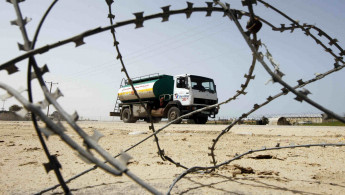Fuel shortage forces Gaza's only power plant to shut
The closure of the plant, which normally provides around a fifth of Gaza's electricity, will only exacerbate an already critical power shortage.
Nearly two million people live in Gaza and receive only four hours of electricity a day. Hospitals and other vital services rely on private generators provided by the United Nations, who warn Gaza hospitals are on the 'verge of disaster' as fuel for emergency generators run out.
Mohammed Thabet, spokesperson for Gaza's energy distribution company, said it had been informed by the energy authority that the power station stopped functioning at midnight because of the lack of fuel.
The plant normally provides around 20 megawatts a day using fuel imported from Egypt. The only energy being imported now comes from Israel, roughly 120 megawatts.
"The Gaza Strip needs around 500 megawatts a day. We have an energy deficit of 380," Thabet added.
Key services have been suspended in recent weeks in three hospitals and 16 medical centres as crippling fuel shortages meant generators were unable to function, said the health ministry in Gaza earlier in the week.
In a statement, the distribution company called for rapid moves to provide fuel to the plant again.
Last week, the UAE pledged $2 million after an emergency UN appeal.
The internationally recognised Palestinian government, based in the West Bank and run by Hamas's longtime rivals Fatah, has accused the Islamists of exaggerating the problem, saying fuel and funding have been provided.
Hamas last week accused the PA of deliberately failing to fulfil its fuel needs.
"We hold the government responsible for this collapse and its consequences and call upon all Palestinians to confront this deliberate abandonment of Gaza and its people," a Hamas spokesman said.
Israel has maintained a crippling siege of the Gaza Strip for more than a decade which it says is necessary to isolate Hamas, with whom it has fought three wars since 2008.
The crippling blockade of the besieged enclave has led to chronic energy and medication shortages, and tightening restrictions on exit permits for Gazans in need of medical care outside of the territory pose critical health risks.
Human rights groups say it amounts to collective punishment of Gaza's two million residents.





 Follow the Middle East's top stories in English at The New Arab on Google News
Follow the Middle East's top stories in English at The New Arab on Google News
![Both Hamas and the Palestinian Authority welcomed the ICC arrest warrants [Getty]](/sites/default/files/styles/image_330x185/public/2024-11/GettyImages-2178351173.jpg?h=199d8c1f&itok=TV858iVg)

